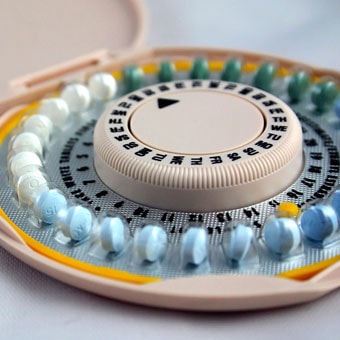
For decades women have been waiting for a birth control pill for men. Just when it sounds like we’re getting close, it gets taken away due to side effects or lack of effectiveness. But there is new research coming from Michigan State University that provides a fascinating alternative to the traditional birth control pill for men. The theory is a bit out there, but it is an option. Instead of blocking the movement of sperm, what if you could turn off the gene that controls its production?
A team of scientists found that they could do this in mice. Now, you’re probably thinking – but it’s mice. Well, mice actually have many of the same genes for reproduction as humans do. So it’s not that far-fetched. The MSU researchers created a line of genetically modified mice, lacking the sperm-producing gene. Without the gene, the development of sperm was hindered. Which left the altered mice with fewer sperm and smaller testicles – effectively making them sterile. What is great about this is that the mice experienced no significant side effects.
If you’re a guy and you’re reading this, don’t get too worked up about this just yet. This is a long, long way from actually being a viable form of contraception. But the idea of this might be an extremely lucrative route. Why? Well, because there aren’t any male contraceptives on the market. This would be the first. If it works that is. There is a male contraceptive candidate entering human clinical trials in the next year or so. It’s a gel that uses a technique called “reversible inhibition of sperm under guidance” to block sperm from being ejaculated. It definitely looks promising in the trials being done on rabbits and primates. So maybe that will make it there first. Even if it does, this would just be another option – and still very lucrative.

This isn’t really new though. Pharmaceutical companies have been reluctant to invest a lot into the male contraceptive market. Few techniques or drugs have moved past initial phases of testing. Which is partially due to the fact that the bar for side effects is extremely low. Whereas women’s birth control can cause a ton of side effects. What’s interesting about this whole issue is that regulators view side effects in the female drug as acceptable because it’s preventing pregnancy. Men, however, aren’t at risk of getting pregnant and therefore the side effects are taken into greater consideration. Are you kidding me? This is basically saying that women have to put up with side effects because they’re the ones at risk of getting pregnant.
Perhaps these regulators aren’t familiar with how one goes about getting pregnant. I don’t want to get into an equality rant, but I think you can see pretty clearly how these two scenarios are fall from equal. The more compelling argument is that men produce millions and millions of sperm in a month. Whereas women only produce one egg a month. It takes just one of each to get pregnant. Which means the burden for getting pregnant lies with the man, doesn’t it?
What does this mean for the birth control industry? Hopefully, some new ways to prevent pregnancy which include men. Female birth control is effective, but it can do a lot of damage to a woman, so I think that other means should be explored. Women bear the brunt for birth control and pregnancy a lot more than men. But like I said before, it takes two to tango, so perhaps the world is finally ready for male contraception.
